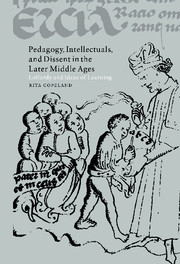Book contents
- Frontmatter
- Contents
- Acknowledgments
- General introduction: pedagogy and intellectuals
- PART 1 From pedagogies to hermeneutics: childhood, the literal sense, and the heretical classroom
- PART 2 Violent representations: intellectuals and prison writing
- 3 Richard Wyche and the public record
- 4 William Thorpe and the historical record
- Bibliography
- Index
- CAMBRIDGE STUDIES IN MEDIEVAL LITERATURE
3 - Richard Wyche and the public record
Published online by Cambridge University Press: 22 September 2009
- Frontmatter
- Contents
- Acknowledgments
- General introduction: pedagogy and intellectuals
- PART 1 From pedagogies to hermeneutics: childhood, the literal sense, and the heretical classroom
- PART 2 Violent representations: intellectuals and prison writing
- 3 Richard Wyche and the public record
- 4 William Thorpe and the historical record
- Bibliography
- Index
- CAMBRIDGE STUDIES IN MEDIEVAL LITERATURE
Summary
The most important struggle faced by the Lollard intellectuals writing from prison is one that is common to what is often the autobiographical mode of prison writing. One modern prison writer, Ngugi wa Thiong'o, has expressed this struggle well in the preface to his detention memoir: “I have, therefore, tried to discuss detention not as a personal affair between me and a few individuals, but as a social, political, and historical phenomenon.” Moving beyond personal narrative, converting self-formation into a “social, political, and historical phenomenon,” is the claim that the Lollard texts also make explicitly, as both their envoys indicate, even while their strategies for accomplishing this end may not resemble those of celebrated twentieth-century prison writers like Ngugi, or, more recently, Ken Saro Wiwa and Nelson Mandela, who have spoken directly to the political and historical implications of modern imprisonment. It is worth noting that the testimonies of Wyche and Thorpe are virtually the only narratives of the Lollard movement, outside of official trial records (including such heterogeneous matter as John Oldcastle's examination), that offer fully realized personal, and in that respect “biographical,” accounts. That the only personal testimonies of the Lollard movement should be accounts of interrogation under detention is not in itself surprising, since there is no situation that more sharply defines the dissenter.
- Type
- Chapter
- Information
- Pedagogy, Intellectuals, and Dissent in the Later Middle AgesLollardy and Ideas of Learning, pp. 151 - 190Publisher: Cambridge University PressPrint publication year: 2001



